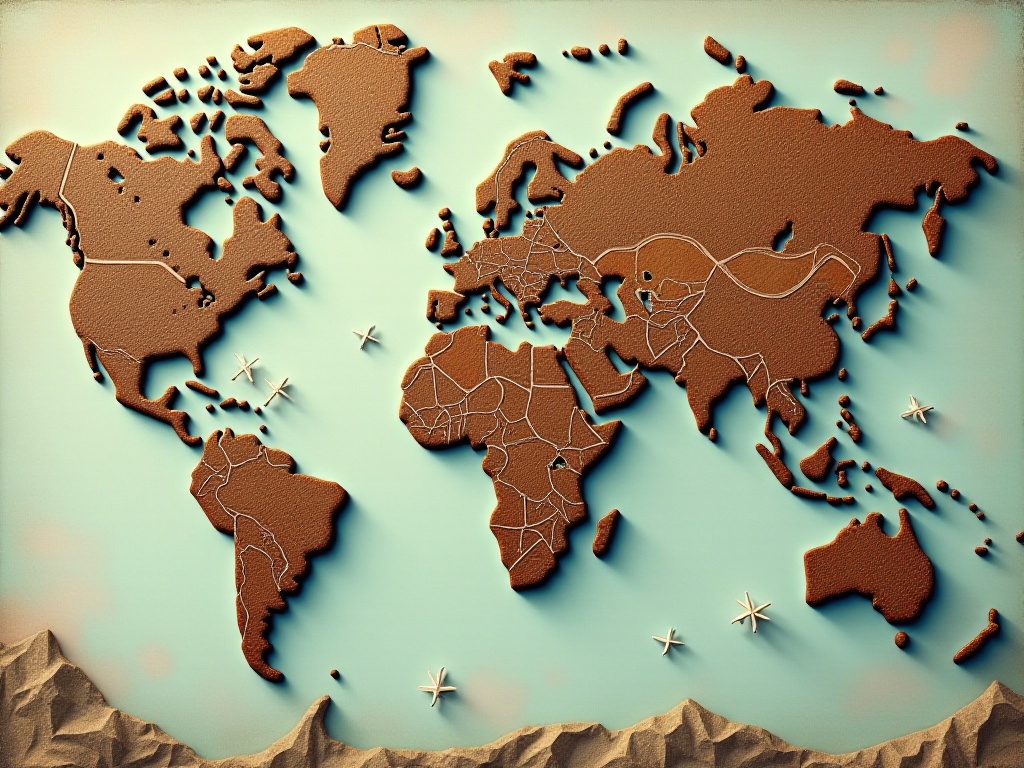Introduction
Thinking back to my Southeast Asian trip last month brings both sweet and bitter memories. I had originally planned a two-month journey, eagerly anticipating exploring various countries in Southeast Asia. However, due to poor budget planning, I had to pack up and return home after just one month. The feeling of regret still haunts me. During the last week in Vietnam, I had to carefully count every penny, worried about having enough money for the return flight, and couldn't even try local specialty foods. This experience taught me a profound life lesson about the importance of travel budgeting.
I don't want more fellow travelers to encounter such painful experiences, so today I'm sharing my hard-learned lessons with you. Through sharing my experiences, I hope to help you avoid some pitfalls in your future travels, have more fun, and go further.
The Value of Budgeting
To be honest, before learning the hard way, I also thought travel budgeting wasn't a big deal. My thinking was naive then, believing that just bringing enough money would suffice, but I often encountered various unexpected expenses during the journey. For instance, in Singapore, I thought my budget was quite sufficient, but I found that local prices were much higher than expected. A regular Hainanese chicken rice set meal cost 8 SGD, equivalent to about 40 RMB, and this was just at an ordinary hawker center. Going to a slightly better restaurant would easily cost over 100 RMB.
Moreover, insufficient budget brings not just financial pressure but also psychological burden. I remember in Malaysia, seeing a super famous water sport activity but having to miss it due to budget constraints. That feeling of having something right in front of you but not being able to experience it was particularly painful.
A detailed travel budget plan is like a compass for your journey. It not only lets you clearly know how much you can spend at each stage but also helps you allocate funds reasonably, making your travel experience more complete and enriching. Through proper budget planning, you might even discover that you can visit more places and try more experiences.
Different Travel Styles
Everyone has different travel styles, so naturally, their budget priorities differ. As a frequent traveler, I've seen all kinds of travelers with very different budget needs and focus points.
For example, backpackers typically focus on getting the maximum travel experience with minimal money. I have a friend who's a typical backpacker - to save money, he would stay in youth hostels for a month straight, spending only 20-30 RMB per day on accommodation. But he used the saved money on experiencing local specialty activities like skydiving and diving. In his view, accommodation just needs to be safe and clean, while the important thing is having more funds for memorable activities.
In contrast, food enthusiasts have completely different budget priorities. I made a big mistake when I was in Japan last year. I was too focused on saving money and cut the food budget too much. As a result, I missed several Michelin-starred restaurants I really wanted to visit, which I still regret. Some food experiences might be once-in-a-lifetime opportunities, and missing them just to save a bit of money really isn't worth it.
Then there are luxury travelers who value accommodation quality and comfort more. I have a girlfriend who's like this - she'd rather visit fewer attractions but stay in five-star hotels. She says hotels aren't just places to sleep but an important part of the travel experience. Waking up in luxurious surroundings and enjoying hotel facilities every day is itself a pleasure.
In recent years, immersive travel has also become increasingly popular. These travelers usually stay in one place for a longer time, renting apartments or guesthouses, living like locals. Their budget priorities often focus on experiencing local culture and lifestyle, such as taking cooking classes or learning local crafts. While this travel style might seem to have higher accommodation and daily expenses, because of the longer stay, the average daily cost might actually be lower than short-term travel.
So, there's no one budget plan that suits everyone. You need to create your budget plan based on your travel purposes and personal preferences. If you particularly love food, allocate more to the dining budget; if you care more about accommodation experience, then raise the standard for lodging expenses accordingly. The important thing is to let the budget serve your travel goals, rather than letting it limit your experiences.

Budgeting Steps

Setting Total Budget
Determining the total budget is the most crucial first step in travel planning. This seemingly simple step actually involves many factors to consider.
First, evaluate your disposable funds. This includes your savings, recent months' income, and available credit card limits. However, note that credit cards are best used only for prepaid expenses like flights and hotels, or in emergencies, and shouldn't be the main source for daily travel expenses.
Speaking of credit cards, I must mention the clever use of credit card points. On my last trip to Thailand, I used credit card points to exchange for round-trip flights, saving over 3,000 RMB. Many credit cards now offer airline mileage accumulation, and if you mainly use credit cards for daily spending, points can quickly add up to enough for flight tickets.
Besides regular funding sources, also consider possible discounts and rebates. For example, coupons from major OTA platforms, membership points, airline mileage offers, etc. I have a habit of saving these offers when I see them, and they come in handy when needed.
When setting the total budget, always leave ample buffer space. I usually add 15%-20% to the calculated budget as emergency funds. It's best not to touch this money, but it can be useful when you encounter unexpected situations, like needing medical care or wanting to participate in a special activity.

Expense Categories
After determining the total budget, it's time to start specific expense categorization. While this step seems tedious, doing it well can make the entire travel process smoother.
First is transportation costs, usually the largest portion of the entire travel budget. Besides round-trip flights, you need to consider destination transportation costs. Taking Japan as an example, if you plan to travel between multiple cities, Shinkansen fees are a significant expense. Last time I bought a 7-day JR Pass for 20,000 yen, equivalent to over 1,000 RMB. Though it seems expensive, buying individual tickets might cost more.
Also, many people easily overlook airport-to-city transportation costs. In some major cities, this expense isn't small. For instance, in London, from Heathrow Airport to the city center, the Express train costs about 25 pounds one way, nearly 220 RMB. So when planning transportation budget, these details need to be considered.
Accommodation is the second largest expense. There are many accommodation choices now, from luxury hotels to youth hostels, from guesthouses to capsule hotels, with huge price differences. I stayed in a capsule hotel in Tokyo - though the space was small, facilities were complete and super clean, costing only 3,000 yen per night, much cheaper than regular hotels. For long-term travel, accommodation costs add up to a significant expense, so careful calculation is necessary.
Food expenses are also an important component. In Singapore, a meal at a regular restaurant costs about 15-20 SGD, equivalent to 75-100 RMB. If you want to try local specialties or Michelin restaurants, the budget might need to be several times higher. So I suggest reserving at least 300 RMB for daily food budget to fully enjoy local cuisine.
Don't forget daily expenses like internet costs. Although many places now have free WiFi, it's still recommended to buy local phone cards or portable WiFi for convenience. In Japan, a 7-day unlimited data phone card costs about 3,000 yen. These seemingly small expenses add up to a significant amount.
Essential Preparations
Pre-departure preparation costs are often overlooked, but these are essential investments. First is visa fees, which vary greatly between countries. For example, a Vietnam visa through an agent usually costs around 300 RMB. Applying for a European Schengen visa costs more, plus various document notarization fees.
Insurance is another necessary expense. Although you might not use it during the trip, the consequences of not having insurance when accidents happen can be severe. I recommend at least buying accident and medical insurance, and if carrying valuable items, consider property insurance too. A basic travel insurance policy might cost 200-300 RMB, but it's definitely a worthy investment.
If visiting certain regions, you might need vaccinations. This expense isn't small either, with some vaccines costing hundreds per shot. Some vaccines need to be administered months in advance, so plan ahead.
Additionally, prepare some emergency items like common medicines and power adapters. These things are cheaper to buy domestically, as prices might be several times higher abroad.
Budget Control
Budget Principles
When making a budget, I most commonly use the principle of "overestimate expenses, underestimate income." This might sound pessimistic, but this conservative attitude actually lets you travel more worry-free.
For example, when estimating accommodation costs, I add a 10%-20% buffer to market average prices. Because travel time might coincide with peak season when hotel prices increase, or if the planned accommodation has problems and you need to switch to another place, these can all lead to budget overruns.
When planning itineraries, also leave some flexible time and budget. Sometimes during travel, you might discover unexpected good places to visit, and if the budget is too rigid, you might miss these wonderful experiences. This happened to me in Chiang Mai - I hadn't planned to take a cooking class, but a local friend strongly recommended it, and fortunately I had budget flexibility. That class became one of the most memorable experiences of the trip.

Money-Saving Tips
Through multiple travel experiences, I've summarized some practical money-saving tips. First is choosing suitable travel times. Off-season travel not only saves 30%-50% on accommodation but also means fewer crowds for a better experience. For example, avoiding cherry blossom and autumn foliage seasons in Japan can make accommodation much cheaper.
Timing for booking flights is also important. From my experience, booking flights 3-6 months in advance usually gets better prices. Especially for popular routes, early bird prices can be thousands less than near-departure prices. Also, many airlines occasionally offer special price tickets, so following their official websites and social media accounts might help you grab good deals.
When shopping abroad, remember to claim tax refunds. Many people think it's troublesome and don't bother, but many shopping centers now have self-service tax refund machines that are convenient to use. The refund amount isn't small either, sometimes reaching 10%-20% of the purchase amount. When shopping in Korea, I saved nearly 1,000 RMB through tax refunds.
For accommodation, if traveling long-term, consider renting apartments or guesthouses. Though the unit price might be slightly higher than hotels, you can cook for yourself, saving money in the long run. Plus, living in local communities helps you better experience local life.
Food expenses also have many saving opportunities. For example, you can buy ingredients from local supermarkets to prepare breakfast, have lunch at local small shops, and then go to a better restaurant for dinner. This way you can taste local food while controlling budget. In some high-cost countries, lunch special sets are usually much cheaper than dinner, so you can arrange main meals for lunchtime.

Final Words
After experiencing that failed Southeast Asian trip, I deeply understand the importance of travel budgeting. It's not a constraint on your enjoyment, but a helpful assistant in realizing your travel dreams. Through reasonable budget planning, you can not only get the maximum travel experience within limited funds but also make the entire journey more relaxed and enjoyable.
Everyone will encounter insufficient budget situations; the key is to learn from them and do better in future travels. I hope through my sharing, I can help you avoid some detours in your future travels. The meaning of travel isn't about how much money you spent, but how many unforgettable memories you collected. Let's discover the beauty of this world in smarter ways together!


